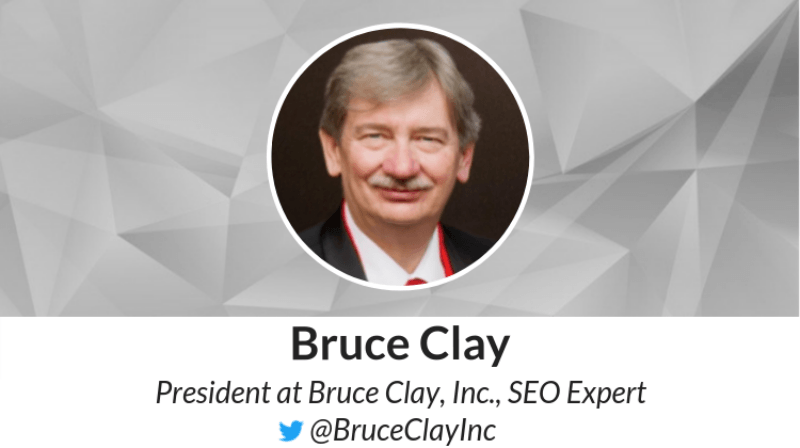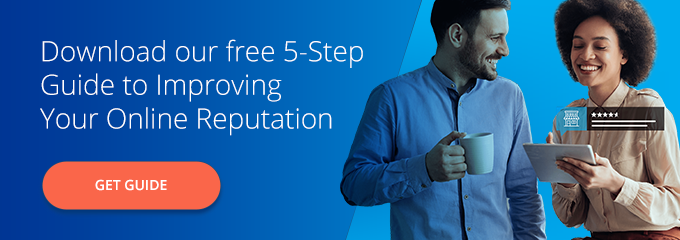A Q&A with SEO Expert Bruce Clay on Digital Marketing Strategy
Reputation Staff Writer


Bruce Clay is a leader in search engine optimization. He is the founder and president of Bruce Clay, Inc., an international digital marketing optimization firm. He has executive leadership experience in several top Silicon Valley companies and has been featured in the PC Week, Smart Money, the Wall Street Journal and Wired.
Prior to launching Bruce Clay, Inc. in 1996, Bruce operated as an executive with several high-tech businesses, with a far-reaching professional background in leading Silicon Valley firms. He is the author of Search Engine Optimization All-in-One for Dummies and Content Marketing Strategies for Professionals.
He recently spoke with us about SEO opportunities for companies, common mistakes and the importance of website self-assessment.
Follow Bruce Clay on Twitter for valuable digital marketing tips: https://twitter.com/bruceclayinc
This interview has been edited and condensed.
What are some of the biggest mistakes businesses make when it comes to their SEO strategy?
I have found that most businesses start an SEO program without training. Businesses commonly do not know what SEO is, but they do it anyhow. They pick a direction based on hearsay and guessing and not based on education. As a result, they tend to do a lot of things of marginal (if any) benefit. The link-building era is one example where all that mattered was getting any link, resulting in harm to businesses. So not understanding what works and best practices is a big deal.
Even with a mature SEO expert with many years of experience under their belt, many companies that develop an SEO plan and determine that they need to change, do not implement. That’s a big mistake – ignoring something that can generate significant traffic simply gives money to your competition. This post may help provide some additional insight.
What are the top three best practices companies can do to improve their SEO?
First, clean your backlink profile. Every site has some inbound links from bad neighborhoods that are poison to your rankings.
Second, optimize your on-page content aligned with what the search engines like. This takes some technology to analyze and target, but know that each keyword is a separate project with separate page characteristics. Making every page 1,200 words is a mistake.
Last but certainly not least, optimize for mobile use and speed. Faster is far better, and mobile usage is a big deal.
How critical is social media marketing to a broader digital marketing strategy? How do you measure ROI?
I consider social media to be about relationships as well as advertising. We do not manage relationships for clients, as that is seldom directly attributable to revenue. We consider social media to be a catalyst for traffic and conversions, and it supports those efforts. Attribution is difficult, because there is no direct correlation between a social event, a visitor and a conversion.
We also believe that a bad online reputation is poison. People tend to read one or two bad reviews and assume the worst. Disqualification is easy; qualification takes time. Trust is pivotal.
Any cautionary tales about what businesses should not do when it comes to their online presence?
A business should not disregard the value of testimonials and online reviews. People need to trust you and the site in order to want to support you with a sale, and if you have no testimonials, people think that yours is not the site where they want to do business. We live in a world where negative reviews by competitors and irate users are highly visible. They can support or drag down your brand.
Also, understand that the digital world changes daily. There is no coasting or “good enough.”
How do you think about the customer journey as it relates to digital marketing?
I think that people do not search for customer journey terminology. People still ask questions or even use just a keyword. So to me, the role of the website is first to gain traffic. Then the user that lands on your site may be interested in the customer journey. It is good practice to help guide the user to what they want. It’s bad practice to not provide that direction, and worse practice to never have the traffic in the first place.
Customer journey requires an accurate persona for your visitor. Defining an accurate persona takes effort and wisdom when you review your content. Do you address their mission – the reason they are searching?
What can businesses do to understand better their online presence and make investments in improving it?
Most businesses recognize that they do not understand how to properly self-assess their sites. This is because of inadequate time, insufficient training or not having guidelines and tools. We believe that the proper planning requires that you identify where you are going, but you also need to know where you are starting from. Without those two points, you cannot plan your trip.
My recommendations:
- Take a comprehensive training course
- Get a professional site audit
- Keep the SEO consultant handy
- Make small changes and see what happens
- Loop
What have been the most pivotal SEO changes in the past decade?
The industry has pivoted from an agency-centric search marketing community to more of a training and software tools economy. As companies develop in-house expertise, many firms believe that they can do their own search marketing without agencies. This evolution is resulting in significant changes in service demand, and how money flows for digital services.
On a technology level, we have seen that the search engines are themselves entering the software business, sometimes providing free services that compete with existing companies that derive their income from similar software products. This tendency for large companies to leverage their wealth to compete with smaller companies is a pivotal change for the SEO space, where companies are more dependent upon software and less on agency support. Companies are trusting the wolf to guard the hen house.
These changes will reduce the number of experts as the market is guided towards paid advertising.
What are the ‘next big things’ when it comes to digital marketing? Anything businesses can do now to get ready?
We know that voice is important, but video will dominate. We know that SEO is critical, but it will become a fight for top-four positioning.
We understand that local services will be spreading across the search results pages, making first-page results more competitive. We see that SEO will be vital for information sites, but advertising will be more important for e-commerce sites. The only big winners are those that move forward now or the search engines. All others fall behind, and catching up is difficult. The era of easy, free traffic is closing.
______
Reputation.com helps brands optimize their content and user experience to attract and retain more customers. To learn more about our strategies to maximize your company’s online reputation, download our free 5-Step Guide to Improving Your Online Reputation.


